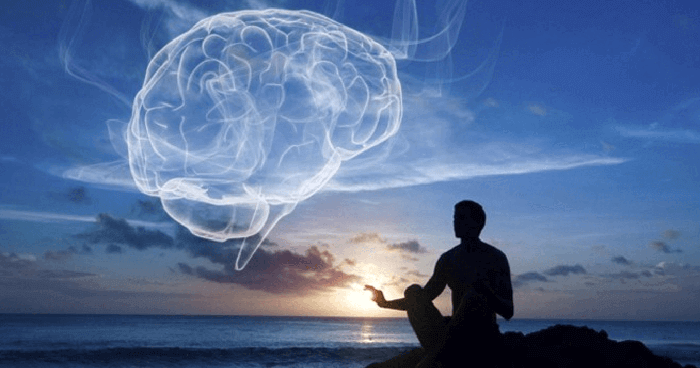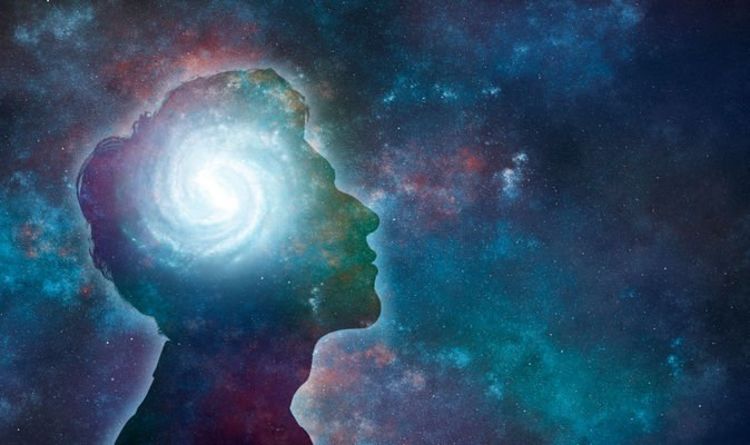The afternoon was gray and chilly, with only the saddle-shaped opening to the canyon visible in the hills beyond town. Sitting on plastic and pads, I welcomed the sun as it poked through near the horizon in the western sky. For some precious minutes, brilliant orange light flooded the land and illuminated the hills in the distance, and lit the sycamores around me in alpenglow.
Beyond personal interpretation or imagination, a reverential quality came over the land and flooded into one. One felt, as never before, that the Earth is love.
Suddenly it began to sprinkle in the immediate vicinity. With the sun still shining near the horizon behind one, a partial rainbow appeared over the hills before one. The brain became very quiet, with not a flutter of thought. It felt as if I wasn’t there. An ineffable sacredness suffused the land and infused the attentively quiet mind/brain.

So why does one’s brain revert to the noise and suffering of thought rather than remain in silence, emptiness and love? Is it a personal thing, or a universal phenomenon?
Generally speaking, the human brain is full of thought, and the mental and emotional residues of thought. Thought is like the noise of a busy freeway that never stops, and hardly ever slows.
Is it because the habit of psychological thought is tens of thousands of years old, and only so-called mystics experience states of seeing and being without the filter of symbols and memories?
Is it because we deeply fear the loss of the known, both as knowledge and experience, and never fearlessly experience the emptiness of being?
Is it because the human brain is ‘wired’ for symbolic activity, and the state of unmediated perception is a rare exception, labeled ‘mystical experience?’
All the above perhaps. But the pressing question is: Can the brains of ordinary, serious individuals fall quiet in undirected attention to the movement of thought/emotion, empty the mental and emotional residues stored as memory, and drink from the infinite well of silence and emptiness?
Perhaps everywhere in the universe where life evolves, in its random way, potentially intelligent creatures that break the bonds of ecological niche and consciously manipulate their environments, there is the tendency to perilously fragment the seamless wholeness of their planets, as humans are doing to the Earth.
The ultimate existential paradox is that the silent, conscious awareness of being and inviolability requires the non-linear evolution of creatures possessing conscious thought, even though conscious thought then tends to wreak havoc on its home planet.
Clearly brains such as ours are necessary to see and feel, indeed to participate in the silence and emptiness of the cosmic mind.
As smart as crows, orcas and bonobos are, the human brain is almost certainly the only brain on this planet that has the capacity for conscious awareness of the numinous. Therefore it isn’t science and technology that make us human beings, or even language, art and culture, but our spiritual and philosophical capacity.
Einstein said, “I have no better expression than the term ‘religious’ for this trust in the rational character of reality and its being accessible, at least to some extent, to human reason.” [Italics mine]
However Einstein was also very deterministic and somewhat deistic, maintaining, “Everything is determined, the beginning as well as the end, by forces over which we have no control…we all dance to a mysterious tune, intoned in the distance by an invisible player.”

Though that may be true on a cosmic scale, the universe, and especially beings with the potential for complete consciousness, contains a creative, indeterminate aspect, which has nothing to do with choice and free will, and everything to do with wholeness, responsibility and insight.
There is great beauty in the paradox between the temporality and space-time, in which the brain indisputably exists, and directly experiencing the silent and empty ground of being, which the brain is capable of when thought, knowledge and experience are completely still.
Meditation, therefore, is the spontaneous stillness of thought in inclusive, undirected attention.
Conceiving of God as referring to inscrutable cosmic intelligence, I’m reminded of what Einstein said in a letter to David Bohm: “If God created this world, his primary concern was certainly not to make its understanding easy for us.”
Though it dominates the human brain, and the Earth, thought is not the entire brain anymore than it is the entirety of nature. When the brain is completely quiet and empty of thought, it sees, feels and shares in the throbbing silence and creative emptiness of Mind.
Martin LeFevre

